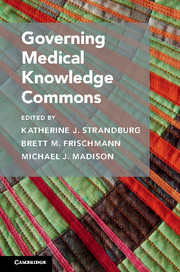
Governing Medical Knowledge Commons makes three claims: first, evidence matters to innovation policymaking; second, evidence shows that self-governing knowledge commons support effective innovation without prioritizing traditional intellectual property rights; and third, knowledge commons can succeed in the critical fields of medicine and health. The editors’ knowledge commons framework adapts Elinor Ostrom’s groundbreaking research on natural resource commons to the distinctive attributes of knowledge and information, providing a systematic means for accumulating evidence about how knowledge commons succeed. The editors’ previous volume, Governing Knowledge Commons, demonstrated the framework’s power through case studies in a diverse range of areas. Governing Medical Knowledge Commons provides fifteen new case studies of knowledge commons in which researchers, medical professionals, and patients generate, improve, and share innovations, offering readers a practical introduction to the knowledge commons framework and a synthesis of conclusions and lessons.
Reviews
‘Governing Medical Knowledge Commons is a very interesting and useful book, and I am delighted to say so! Innovation development is increasingly becoming open and distributed over time. Whether and how the fruits of this openly revealed activity can be collected and efficiently utilized as a commons is a very important next question. Strandburg, Frischmann, and Madison greatly help further progress via this collection of very thoughtful studies on pioneering medical commons models and trials.’
‘This volume builds on Elinor Ostrom’s research on the commons. Understanding the institutions that promote cooperation is critical to good governance and improving social welfare. The authors in this volume provide case studies of governance in the medical commons. The insights are pathbreaking and will lead to better policies for medical research. Moreover, the insights here will be synergistic to research in other areas of governance of commons.’
Lee J. Alston, Director of the Ostrom Workshop, Indiana University, Bloomington
‘This book makes significant advances on a decades-long research agenda through which Elinor Ostrom and other commons researchers uncovered the reasons behind the often surprising success of community-based management of natural resources. Contributors to this volume demonstrate that their concept of ‘commons as a mode of governance’ goes well beyond standard protections for intellectual property rights to integrate collaborative practice into the very heart of innovation in medical research and treatment. Case studies detail several impressive and diverse examples of this powerful synthesis of research and practice, and the editors conclude with practical lessons for how we might achieve comparable levels of improvement in other areas.’
Read the Book via Cambridge Core (Open Access)
Knowledge Commons and the Road to Medical Commons by Katherine J. Strandburg, Brett M. Frischmann, and Michael J. Madison
The Knowledge Commons Framework by Katherine J. Strandburg, Brett M. Frischmann, and Michael J. Madison
Leviathan in the Commons: Biomedical Data and the State by Jorge L. Contreras
Centralization, Fragmentation, and Replication in the Genomic Data Commons by Peter Lee
Genomic Data Commons by Barbara J. Evans
Population Biobanks’ Governance: A Case Study of Knowledge Commons by Andrea Boggio
The Sentinel Initiative as a Knowledge Commons by Ryan Abbott
Cancer: From a Kingdom to a Commons by Michael Mattioli
The Greatest Generational Impact: Open Neuroscience as an Emerging Knowledge Commons by Maja Larson and Margaret Chon
Better to Give Than to Receive: An Uncommon Commons in Synthetic Biology by Andrew W. Torrance
Governance of Biomedical Research Commons to Advance Clinical Translation: Lessons from the Mouse Model Community by Tania Bubela, Rhiannon Adams, Shubha Chandrasekharan, Amrita Mishra, and Songyan Liu
Constructing Interdisciplinary Collaboration: The Oncofertility Consortium as an Emerging Knowledge Commons by Laura G. Pedraza-Fariña
The Application of User Innovation and Knowledge Commons Governance to Mental Health Intervention by Glenn Saxe and Mary Acri
Challenges and Opportunities in Developing and Sharing Solutions by Patients and Caregivers: The Story of a Knowledge Commons for the Patient Innovation Project by Pedro Oliveira, Leid Zejnilović, and Helena Canhão
Chronic Disease, New Thinking, and Outlaw Innovation: Patients on the Edge in the Knowledge Commons by Stephen Flowers
The North American Mitochondrial Disease Consortium: A Developing Knowledge Commons by Katherine J. Strandburg and Brett M. Frischmann
The Consortium of Eosinophilic Gastrointestinal Disease Researchers (CEGIR): An Emerging Knowledge Commons by Katherine J. Strandburg and Stefan Bechtold
Governing Knowledge Commons: An Appraisal by Katherine J. Strandburg, Brett M. Frischmann, and Michael J. Madison
About the Editors and Contributors
Editors
Katherine J. Strandburg is the Alfred B. Engelberg Professor of Law at New York University
Michael J. Madison is Professor of Law at the University of Pittsburgh
Contributors
Ryan Abbott is Professor of Law and Health Sciences at the University of Surrey
Rhiannon Adams
Stefan Bechtold is Professor of Intellectual Property at ETH Zurich
Andrea Boggio is Professor for Legal Studies at Bryant University
Tania Bubela is Dean and Professor of Health Sciences at Simon Fraser University
Helena Canhão
Shubha Chandrasekharan is a Health Sciences Administrator at the National Institutes of Health
Jorge L. Contreras is Professor of Law at the University of Utah
Barbara J. Evans is Professor of Law and Stephen C. O’Connell Chair at the University of Florida
Stephen Flowers is Professor of Management at the University of Kent
Maja Larson is General Counsel of the Allen Institute
Peter Lee is the Martin Luther King Jr. Professor of Law at the University of California Davis
Michael Mattioli is Professor of Law at Indiana University
Songyan Liu
Amrita Mishra is a community development specialist
Pedro Oliveira is Professor MSO at Copenhagen Business School
Laura G. Pedraza-Fariña is Professor of Law at Northwestern University
Andrew W. Torrance is the Paul E. Wilson Distinguished Professor of Law at the University of Kansas